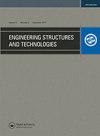ANALYSIS OF BEHAVIOUR OF CALCIUM SILICATE HOLLOW BLOCKS MASONRY SUBJECTED TO THE CONCENTRATED LOAD
引用次数: 0
Abstract
Loading of masonry with concentrated load is a sufficiently common case of loading which occurs due to structures of various purposes and sizes which lean against masonry wall, column or partition wall. Reinforced concrete or metal beams, reinforced beams, wooden structures of roof or span are leaned against masonry structures most usually. Investigations show that masonry structures under concentrated load withstand higher loads than structures of which the whole surface area is compressed. In most cases traditional bricks’ masonry under concentrated load was investigated. Its head joints are filled with mortar. This paper describes the experimental and numerical modeling results of investigation of calcium silicate hollow blocks masonry with thin layered mortar and unfilled head joints compressed by concentrated load. The more dangerous case when the edge of masonry unit (wall) is affected by concentrated load was chosen for analysis. Preliminary investigations have shown that the bed joints transmiss horizontal stresses. The stress distribution angle is close to 60°, i.e. close to stress distribution in masonry with filled head joints.硅酸钙空心砌块砌体在集中荷载作用下的性能分析
带有集中荷载的砌体荷载是一种非常常见的荷载情况,这种荷载是由于各种用途和尺寸的结构倚靠砌体墙、柱或隔墙而发生的。钢筋混凝土或金属梁、钢筋梁、屋顶或跨度的木结构通常靠在砌体结构上。研究表明,砌体结构在集中荷载下比整个表面积被压缩的结构承受更高的荷载。在大多数情况下,对集中荷载下的传统砖砌体进行了研究。其头部接缝用砂浆填充。本文介绍了在集中荷载作用下,采用薄层砂浆和无填充头缝的硅酸钙空心砌块砌体的试验和数值模拟研究结果。选择砌体单元(墙)边缘受集中荷载影响的危险性较大的情况进行分析。初步调查表明,河床接缝传递水平应力。应力分布角接近60°,即接近填充头缝砌体中的应力分布。
本文章由计算机程序翻译,如有差异,请以英文原文为准。
求助全文
约1分钟内获得全文
求助全文

 求助内容:
求助内容: 应助结果提醒方式:
应助结果提醒方式:


